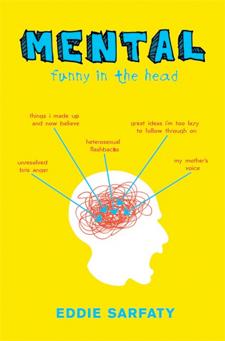Eddie Sarfaty has carved out a thriving and varied career in standup, from extensive TV and festival appearances to teaching gigs at New York University and DC’s Theatre Lab. His first book, a memoir, feels like a bid to rival the reigning Davids (Sedaris and Rakoff) and similarly New Yorker-ish grandees of wit. At its best, this book comes pretty close.
We open with Eddie’s maternal grandmother perched on her JC Penny rocker, dripping tears onto her needlework. She has just forced an honest answer from her queer twenty-something grandson. Granny sniffles, “Well, I thought that you were, and I made up my mind that I was gonna ask!” As Sarfaty’s gay-friendly mom mouths silently from behind the rocker, “You shouldn’t have told her,” Eddie holds grandma’s hand and keeps her well stocked with tissues. As Sarfaty follows his and granny’s linked emotional journeys, you see you’re in the hands of a born storyteller.
Sarfaty sometimes deftly reinvents shopworn writerly shorthand. His miffed mother does not “look at him sideways.” Instead, “her eyes remain focused on me as her head changes from full-front to three-quarter view.” The words fully capture the image — you actually see it rather than just catching the drift. His visuals can also sharply outline a personality in a few deft and merciless strokes. Hoping to adopt a needy cat he encounters a “podgy” gal manning an ancient rotary phone at the pet placement agency: “Her frosted lips against the dirty, flesh-coloured mouthpiece have a disturbing pornographic quality…. She impatiently clicks her baby-pink nails against her cloisonné sweater clip.” The piece grows into a messy feline farce dovetailed with the rocky progress of a live-in relationship. Kitty loses big time.
The off-the-wall standup riffs fill just enough space. A junk food junkie, young Eddie comes up with some creative deterrent uses for his mom’s Lemon Pledge, such as spraying the remaining Oreo cookies before you chuck them in the garbage — because a dozen Oreos after a workout is probably enough. Worried about his masturbation addiction, he actually considers Pledging his pole into shocked submission.
The book veers away from the standup rhythms as needed to delve deeper. Occasionally Sarfaty gives way completely to forthright, unguarded expression. The passage describing an afternoon wandering through the Louvre in Paris, with his mother and mentally disabled father, is poised between funny and terribly sad: a comedy of errors that shifts subtly and powerfully to tender heartbreak. The art on the walls, breaking at last through tourist fatigue and family sorrows, becomes bound up with the emotional dance.
Sarfaty has logged his share of the grunt work that makes for success. We join him on Ptown’s Commercial St, accosting tourists with snappy one-liners and flyers. Guest-star Danny McWilliams helps boost his spirits with puckish and “disturbingly poetic” speculations concerning which horror-flick monster ought to fist George W Bush and what you might catch from rimming Don Knotts.
One chapter, “The Eton Club,” is an intimate tour through the retro social whirl — more wheeze and wobble — of a midtown Manhattan gents’ bar in 1995. Detailing the booze-and-bitch habits of some upscale lifelong drinkers who don’t begrudge 50-buck tips for comely young waiters, the piece offers a well-worn and not terribly compelling social snapshot. Then you start to absorb how unexpectedly attached Sarfaty became to a few of the club’s declining patrons during his bartending stint. The piece builds to a touching conclusion.
The obligatory erotic mishap compilation, courtesy of an exploratory membership at Beef-4-Beef.-com, includes a last-minute escape from a barf fetishist and Eddie fast-talking his way out of a month-long imprisonment in an iron chastity belt. Meanwhile, he dutifully supports his (now widowed) mother’s exploration of a Jewish seniors’ dating site: JewHunt.net. Readers will also learn how to enliven a boring family car trip by playing the “Concentration Camp Alphabet Game.” Sarfaty’s Jewish heritage fuels a macabre comedic thread running throughout the book.
The climactic closing pages take us to Portugal for a spectacularly fraudulent production of Phantom of the Opera. Sarfaty is the hapless stage manager, dragooned into the job by a boyfriend who’s cast in the doomed show. The chapter pulls you along with the pace of a well-structured farce. Though you know where this show is headed, the payoff is pleasingly grim and over-the-top.

 Why you can trust Xtra
Why you can trust Xtra


